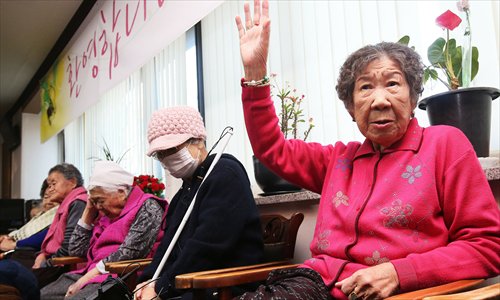Families of Chinese 'comfort women' urge apology
Seoul, Tokyo agree to resolve ‘comfort women’ dispute

South Korean Kang Il-Chul (right), who was forced to serve as a sex slave, or "comfort woman," for Japanese troops during World War II, speaks to reporters after watching a broadcast of a joint press briefing of South Korean and Japanese foreign ministers at their house in Gwangju, Gyeonggi Province, on Monday. Photo: AFP
Families of Chinese "comfort women" demanded a similar apology from Japan on Monday after Japan and South Korea reached a landmark deal to resolve the dispute on wartime forced sex slavery.
"I am very angry and upset, so are many other relatives. If Japan apologizes to the victims in South Korea, why don't they apologize to Chinese victims?" asked Zhou Guiying, son of Guo Xicui, a late "comfort woman" from Shanxi Province.
"They [Japan] shouldn't hold different attitudes toward victims in different countries," Zhou, 60, told the Global Times on Monday, adding that Chinese victims deserve an apology which reflects Japan's remorse and sincerity.
Japan and South Korea reached a "historic" agreement on Monday on the "comfort women" issue, including an apology from Japan and $8.3 million for a foundation to "restore the honor and dignity" of the victims, the Kyodo News reported.
"We have noted the relevant report. The Chinese side always maintains that the Japanese side should face up to and reflect upon its history of aggression and properly deal with the relevant issue with a sense of responsibility," Chinese Foreign Ministry spokesperson Lu Kang said on Monday.
The forced recruitment of the "comfort women" is a grave crime against humanity committed by the Japanese military during World War II against the people of Asia and other victimized countries, noted Lu.
South Korean historians estimate that around 200,000 women, mostly from the Korean peninsula, were forced into sex enslavement, the Xinhua News Agency reported.
Su Zhiliang, director of the China "Comfort Women" Issue Research Center at Shanghai Normal University, estimates that around 400,000 women, including 200,000 from China, were forced into sex enslavement, the People's Daily reported in 2014.
Showing remorse
Prime Minister Shinzo Abe "expressed his heartfelt apology and remorse as prime minister of Japan to all those who have borne physical and psychological scars that will be difficult to heal and who experienced much pain and suffering as comfort women," Japan's Foreign Minister Fumio Kishida said at a press conference, the Asahi Shimbun reported Monday.
"If Abe's apology goes to 'all the comfort women' as he pledged, why are victims in China not included?" asked Kang Jian, a Beijing-based lawyer who has represented Chinese victims in a number of cases concerning the "comfort women" and wartime slavery.
Japan's response shouldn't differ according to the nationality of "comfort women," Kang told the Global Times on Monday, adding that if Japan decides to apologize and compensate the victims in South Korea, there's no reason why they should not do the same for Chinese victims.
Kang has participated in three of the four "comfort women" cases brought against the Japanese government.
There are very few "comfort women" still alive in China, only 23 as of August 2014, and China's last surviving comfort woman to sue the Japanese government over its wartime atrocities died in December at the age of 89.
Seeking justice
A total of 16 "comfort women" in Shanxi sued the Japanese government in 1995 for forced sex slavery and asked Japan to apologize for the atrocity and pay compensation.
In 2007, the Supreme Court of Japan issued the final judgment in which it acknowledged the historical fact but ruled out compensation.
The Japanese government has never formally apologized to the Chinese women who were forced into sex slavery, Kang said.
"The issue cannot end with nothing, and we, the children of the victims in their 60s and 70s, will carry on efforts to seek justice till the end," Zhou told the Global Times.
"My mother died with great sorrow, none of her last days were easy, and I will carry on seeking justice, so will my children," he said.
South Korean President Park Geun-hye and Abe also had a 13-minute telephone conversation where they pledged to boost bilateral ties soon after the agreement, and Abe again expressed an apology and repentance to all "comfort women," the Yonhap News Agency reported.
However, six residents at a home for "comfort women" victims expressed disappointment over the agreement, saying the Japanese government did not make clear its legal responsibility, and the financial assistance would not be official restitution, Korea Joongang Daily reported.
"We don't need any medical aid or favors," Yoo Hee-nam, 88, said. "No one will accept the creation of the fund [which is not formal restitution to pay for Japan's legal responsibility]."
Newspaper headline: China victims urge apology